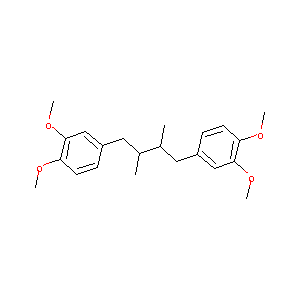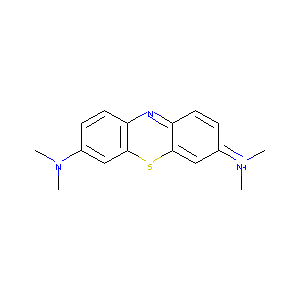| 1 |
Recurrent recessive mutation in deoxyguanosine kinase causes idiopathic noncirrhotic portal hypertension.Hepatology. 2016 Jun;63(6):1977-86. doi: 10.1002/hep.28499. Epub 2016 Mar 31.
|
| 2 |
Terameprocol, a novel site-specific transcription inhibitor with anticancer activity. IDrugs. 2008 Mar;11(3):204-14.
|
| 3 |
Recombinant Plasmodium falciparum glutathione reductase is inhibited by the antimalarial dye methylene blue. FEBS Lett. 1998 Feb 6;422(3):311-4.
|
| 4 |
ClinicalTrials.gov (NCT04370288) Clinical Application of Methylene Blue for Treatment of Covid-19 Patients. U.S. National Institutes of Health.
|
| 5 |
Photoluminescence of CdTe nanocrystals modulated by methylene blue and DNA. A label-free luminescent signaling nanohybrid platform. Phys Chem Chem Phys. 2009 Jul 7;11(25):5062-9.
|
| 6 |
Curcumin ameliorates high glucose-induced acute vascular endothelial dysfunction in rat thoracic aorta. Clin Exp Pharmacol Physiol. 2009 Dec;36(12):1177-82.
|
| 7 |
Inhibition of the bioactivation of the neurotoxin MPTP by antioxidants, redox agents and monoamine oxidase inhibitors. Food Chem Toxicol. 2011 Aug;49(8):1773-81.
|
| 8 |
Identification of environmental chemicals that activate p53 signaling after in vitro metabolic activation. Arch Toxicol. 2022 Jul;96(7):1975-1987. doi: 10.1007/s00204-022-03291-5. Epub 2022 Apr 18.
|
| 9 |
Pharmacologic reductions of total tau levels; implications for the role of microtubule dynamics in regulating tau expression. Mol Neurodegener. 2006 Jul 26;1:6. doi: 10.1186/1750-1326-1-6.
|
| 10 |
Defenses against oxidation in human erythrocytes: role of glutathione reductase in the activation of glucose decarboxylation by hemolytic drugs. J Lab Clin Med. 1991 Apr;117(4):325-31.
|
| 11 |
Profiling the Tox21 Chemical Collection for Acetylcholinesterase Inhibition. Environ Health Perspect. 2021 Apr;129(4):47008. doi: 10.1289/EHP6993. Epub 2021 Apr 12.
|
| 12 |
ADReCS-Target: target profiles for aiding drug safety research and application. Nucleic Acids Res. 2018 Jan 4;46(D1):D911-D917. doi: 10.1093/nar/gkx899.
|
|
|
|
|
|
|


